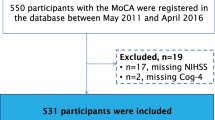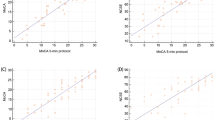Abstract
The purposes of this review were to give the optimal cutoffs of the Montreal Cognitive Assessment (MoCA) by comparing sensitivity and specificity under different cutoffs and compare the MoCA with other screening tools in post-stroke cognitive impairment (PSCI) determined by a neuropsychological evaluation. Articles were derived from a systematic search in PubMed, Web of science, Embase, and CINAHL and were assessed for internal validity by the Quality Assessment of Diagnostic Accuracy Studies-2 (QUADAS-2). The figure of risk of bias was made by Review Manager 5.3, and data of selected studies were synthesized by MetaDisc 1.4. Twelve diagnostic studies, involving 2130 patients, were included. The area under the curve (AUC) under cutoffs of 20v19, 21v20, and 26v25 are 0.90, 0.90, and 0.95, showing high predictive validity for PSCI screening within 1 month. When the sensitivity and specificity are equal important, the optimal cutoff is 20v19 (Youden Index = 0.58). Compared to the Mini-Mental State Examination (MMSE), the MoCA has higher sensitivity but lower specificity. The optimal cutoff differs in different stages of stroke. Both the MMSE and MoCA are appropriate screening tools for PSCI, and the use of these two tools should be in accordance with the aim of screening. The Addenbrooke’s Cognitive Examination-Revised (ACE-R) can act as a supplement for the MoCA.





Similar content being viewed by others
References
Nys GM, van Zandvoort MJ, de Kort PL, Jansen BP, Kappelle LJ, de Haan EH (2005) Restrictions of the Mini-Mental State Examination in acute stroke. Arch Clin Neuropsychol 20(5):623–629. https://doi.org/10.1016/j.acn.2005.04.001
Dong Y, Venketasubramanian N, Chan BP, Sharma VK, Slavin MJ, Collinson SL et al (2012) Brief screening tests during acute admission in patients with mild stroke are predictive of vascular cognitive impairment 3-6 months after stroke. J Neurol Neurosurg Psychiatry 83(6):580–585. https://doi.org/10.1136/jnnp-2011-302070
Barker-Collo S, Feigin V (2006) The impact of neuropsychological deficits on functional stroke outcomes. Neuropsychol Rev 16(2):53–64. https://doi.org/10.1007/S11065-006-9007-5
Claesson L, Lindén T, Skoog I, Blomstrand C (2005) Cognitive impairment after stroke—impact on activities of daily living and costs of care for elderly people. Cerebrovasc Dis 19(2):102–109. https://doi.org/10.1159/000082787
Pasquini M, Leys D, Rousseaux M, Pasquier F, Hénon H (2007) Influence of cognitive impairment on the institutionalisation rate 3 years after a stroke. J Neurol Neurosurg Psychiatry 78(1):56–59. https://doi.org/10.1136/jnnp.2006.102533
Pendlebury ST, Cuthbertson FC, Welch SJ, Mehta Z, Rothwell PM (2010) Underestimation of cognitive impairment by Mini-Mental State Examination versus the Montreal Cognitive Assessment in patients with transient ischemic attack and stroke: a population-based study. Stroke 41(6):1290–1293. https://doi.org/10.1161/STROKEAHA.110.579888
Moroney JT, Bagiella E, Tatemichi TK, Paik MC, Stern Y, Desmond DW (1997) Dementia after stroke increases the risk of long-term stroke recurrence. Neurology 48(5):1317–1325. https://doi.org/10.1212/WNL.48.5.1317
Nys GM, van Zandvoort MJ, van der Worp HB, de Haan EH, de Kort PL, Kappelle LJ (2005) Early depressive symptoms after stroke: neuropsychological correlates and lesion characteristics. J Neurol Sci 228(1):27–33. https://doi.org/10.1016/j.jns.2004.09.031
Feigin VL, Forouzanfar MH, Krishnamurthi R, Mensah GA, Connor M, Bennett DA, Moran AE, Sacco RL, Anderson L, Truelsen T, O'Donnell M, Venketasubramanian N, Barker-Collo S, Lawes CMM, Wang W, Shinohara Y, Witt E, Ezzati M, Naghavi M, Murray C (2014) Global and regional burden of stroke during 1990-2010: findings from the Global Burden of Disease Study 2010. Lancet 383(9913):245–254. https://doi.org/10.1016/S0140-6736(13)61953-4
van Heugten CM, Walton L, Hentschel U (2015) Can we forget the Mini-Mental State Examination? A systematic review of the validity of cognitive screening instruments within one month after stroke. Clin Rehabil 29(7):694–704. https://doi.org/10.1177/0269215514553012
Shen YJ, Wang WA, Huang FD, Chen J, Liu HY, Xia YL, Han M, Zhang L (2016) The use of MMSE and MoCA in patients with acute ischemic stroke in clinical. Int J Neurosci 126(5):442–447. https://doi.org/10.3109/00207454.2015.1031749
Eskes GA, Lanctôt KL, Herrmann N, Lindsay P, Bayley M, Bouvier L, Dawson D, Egi S, Gilchrist E, Green T, Gubitz G, Hill MD, Hopper T, Khan A, King A, Kirton A, Moorhouse P, Smith EE, Green J, Foley N, Salter K, Swartz RH, Heart Stroke Foundation Canada Canadian Stroke Best Practices Committees (2015) Canadian stroke best practice recommendations: mood, cognition and fatigue following stroke practice guidelines, update 2015. Int J Stroke 10(7):1130–1140. https://doi.org/10.1111/ijs.12557
National Institute for Health and Clinical Excellence (2013) Stroke rehabilitation: long term rehabilitation after stroke. www.guidance.nice.org.uk/CG162. Accessed 26 February 2017
Pendlebury ST, Mariz J, Bull L, Mehta Z, Rothwell PM (2012) MoCA, ACE-R, and MMSE versus the National Institute of Neurological Disorders and Stroke-Canadian Stroke Network vascular cognitive impairment harmonization standards neuropsychological battery after TIA and stroke. Stroke 43(2):464–469. https://doi.org/10.1161/STROKEAHA.111.633586
Mancuso M, Varalta V, Sardella L, Capitani D, Zoccolotti P, Antonucci G et al (2016) Italian normative data for a stroke specific cognitive screening tool: the Oxford Cognitive Screen (OCS). Neurol Sci 37(10):1713–1721. https://doi.org/10.1007/s10072-016-2650-6
Dong Y, Sharma VK, Chan BP, Venketasubramanian N, Teoh HL, Seet RC et al (2010) The Montreal Cognitive Assessment (MoCA) is superior to the Mini-Mental State Examination (MMSE) for the detection of vascular cognitive impairment after acute stroke. J Neurol Sci 299(1–2):15–18. https://doi.org/10.1016/j.jns.2010.08.051
Pigliautile M, Chiesi F, Rossetti S, Conestabile Della Staffa M, Ricci M, Federici S et al (2015) Normative data for the ACE-R in an Italian population sample. Neurol Sci 36(12):2185–2190. https://doi.org/10.1007/s10072-015-2330-y
Morris K, Hacker V, Lincoln NB (2012) The validity of the Addenbrooke’s Cognitive Examination-Revised (ACE-R) in acute stroke. Disabil Rehabil 34(3):189–195. https://doi.org/10.3109/09638288.2011.591884
Lim JS, Oh MS, Lee JH, Jung S, Kim C, Jang MU, Lee SH, Kim YJ, Kim Y, Park J, Kang Y, Yu KH, Lee BC (2017) Prediction of post-stroke dementia using NINDS-CSN 5-minute neuropsychology protocol in acute stroke. Int Psychogeriatr 29(5):777–784. https://doi.org/10.1017/S1041610216002520
Dong YH, Xu J, Chan BPL, Seet RCS, Venketasubramanian N, Teoh HL et al (2016) The Montreal cognitive assessment is superior to national institute of neurological disease and stroke-Canadian stroke network 5-minute protocol in predicting vascular cognitive impairment at 1 year. BMC Neurol 16(1):no pagination. https://doi.org/10.1186/s12883-016-0570-y
Zhang H, Zhang XN, Zhang HL, Huang L, Chi QQ, Zhang X, Yun XP (2016) Differences in cognitive profiles between traumatic brain injury and stroke: a comparison of the Montreal Cognitive Assessment and Mini-Mental State Examination. Chin J Traumatol 19(5):271–274. https://doi.org/10.1016/j.cjtee.2015.03.007
Salvadori E, Pasi M, Poggesi A, Chiti G, Inzitari D, Pantoni L (2013) Predictive value of MoCA in the acute phase of stroke on the diagnosis of mid-term cognitive impairment. J Neurol 260(9):2220–2227. https://doi.org/10.1007/s00415-013-6962-7
Pendlebury ST, Markwick A, de Jager CA, Zamboni G, Wilcock GK, Rothwell PM (2012) Differences in cognitive profile between TIA, stroke and elderly memory research subjects: a comparison of the MMSE and MoCA. Cerebrovasc Dis 34(1):48–54. https://doi.org/10.1159/000338905
Hachinski V, Iadecola C, Petersen RC, Breteler MM, Nyenhuis DL, Black SE, Powers WJ, DeCarli C, Merino JG, Kalaria RN, Vinters HV, Holtzman DM, Rosenberg GA, Wallin A, Dichgans M, Marler JR, Leblanc GG (2006) National Institute of Neurological Disorders and Stroke-Canadian Stroke Network vascular cognitive impairment harmonization standards. Stroke 37(9):2220–2241. https://doi.org/10.1161/01.STR.0000237236.88823.47
Davis DH, Creavin ST, Yip JL, Noel-Storr AH, Brayne C, Cullum S (2015) Montreal cognitive assessment for the diagnosis of Alzheimer’s disease and other dementias. Cochrane Database Syst Rev (10):CD010775. https://doi.org/10.1002/14651858.CD010775.pub2
Leeflang MM, Deeks JJ, Gatsonis C, Bossuyt PM (2008) Systematic reviews of diagnostic test accuracy. Ann Intern Med 149(12):889–897. https://doi.org/10.7326/0003-4819-149-12-200812160-00008
Moher D, Liberati A, Tetzlaff J, Altman DG (2009) Preferred reporting items for systematic reviews and meta-analyses: the PRISMA statement. PLoS Med 6(7):e1000097. https://doi.org/10.1371/journal.pmed.1000097
Whiting PF, Rutjes AW, Westwood ME, Mallett S, Deeks JJ, Reitsma JB, QUADAS-2 Group et al (2011) QUADAS-2: a revised tool for the quality assessment of diagnostic accuracy studies. Ann Intern Med 155(8):529–536. https://doi.org/10.7326/0003-4819-155-8-201110180-00009
Review Manager (RevMan) [Computer Program] (2014) Version 5.3. Copenhagen, Denmark: The Nordic Cochrane Centre, The Cochrane Collaboration
Zamora J, Abraira V, Muriel A, Khan K, Coomarasamy A (2006) Meta-DiSc: a software for meta-analysis of test accuracy data. BMC Med Res Methodol 6(1):31. https://doi.org/10.1186/1471-2288-6-31
The Cochrane Collaboration (2013) Cochrane handbook for systematic reviews of diagnostic test accuracy. http://srdta.cochrane.org/. Accessed 26 Feb 2017
Greiner M, Pfeiffer D, Smith RD (2000) Principles and practical application of the receiver-operating characteristic analysis for diagnostic tests. Prev Vet Med 45(1–2):23–41
Walter SD (2002) Properties of the summary receiver operating characteristic (SROC) curve for diagnostic test data. Stat Med 21(9):1237–1256. https://doi.org/10.1002/sim.1099
Park SH, Lee HS (2016) Assessing predictive validity of pressure ulcer risk scales—a systematic review and meta-analysis. Iran J Public Health 45(2):122–133
Higgins JPT, Thompson SG (2002) Quantifying heterogeneity in a meta-analysis. Stat Med 21(11):1539–1558. https://doi.org/10.1002/sim.1186
Cumming TB, Churilov L, Linden T, Bernhardt J (2013) Montreal Cognitive Assessment and Mini-Mental State Examination are both valid cognitive tools in stroke. Acta Neurol Scand 128(2):122–129. https://doi.org/10.1111/ane.12084
Chan E, Altendorff S, Healy C, Werring DJ, Cipolotti L (2017) The test accuracy of the Montreal Cognitive Assessment (MoCA) by stroke lateralisation. J Neurol Sci 373:100–104. https://doi.org/10.1016/j.jns.2016.12.028
Swartz RH, Cayley ML, Lanctôt KL, Murray BJ, Smith EE, Sahlas DJ, Herrmann N, Cohen A, Thorpe KE (2016) Validating a pragmatic approach to cognitive screening in stroke prevention clinics using the Montreal Cognitive Assessment. Stroke 47(3):807–813. https://doi.org/10.1161/STROKEAHA.115.011036
Dong Y, Slavin MJ, Chan BP, Venketasubramanian N, Sharma VK, Collinson SL et al (2014) Improving screening for vascular cognitive impairment at three to six months after mild ischemic stroke and transient ischemic attack. Int Psychogeriatr 26(05):787–793. https://doi.org/10.1017/S1041610213002457
Chan E, Khan S, Oliver R, Gill SK, Werring DJ, Cipolotti L (2014) Underestimation of cognitive impairments by the Montreal Cognitive Assessment (MoCA) in an acute stroke unit population. J Neurol Sci 343(1–2):176–179. https://doi.org/10.1016/j.jns.2014.05.005
Godefroy O, Fickl A, Roussel M, Auribault C, Bugnicourt JM, Lamy C, Canaple S, Petitnicolas G (2011) Is the Montreal cognitive assessment superior to the mini-mental state examination to detect poststroke cognitive impairment? A study with neuropsychological evaluation. Stroke 42(6):1712–1716. https://doi.org/10.1161/STROKEAHA.110
Delavaran H, Jönsson AC, Lövkvist H, Iwarsson S, Elmståhl S, Norrving B, Lindgren A (2017) Cognitive function in stroke survivors: a 10-year follow-up study. Acta Neurol Scand 136(3):187–194. https://doi.org/10.1111/ane.12709
Jacquin A, Binquet C, Rouaud O, Graule-Petot A, Daubail B, Osseby GV, Bonithon-Kopp C, Giroud M, Béjot Y (2014) Post-stroke cognitive impairment: high prevalence and determining factors in a cohort of mild stroke. J Alzheimers Dis 40(4):1029–1038. https://doi.org/10.3233/JAD-131580
Author information
Authors and Affiliations
Corresponding author
Ethics declarations
Conflict of interest
The authors declare that they have no conflict of interest.
Ethical statement
All analyses were based on previous published studies, thus no ethical approval and patient consent are required.
Rights and permissions
About this article
Cite this article
Shi, D., Chen, X. & Li, Z. Diagnostic test accuracy of the Montreal Cognitive Assessment in the detection of post-stroke cognitive impairment under different stages and cutoffs: a systematic review and meta-analysis. Neurol Sci 39, 705–716 (2018). https://doi.org/10.1007/s10072-018-3254-0
Received:
Accepted:
Published:
Issue Date:
DOI: https://doi.org/10.1007/s10072-018-3254-0




